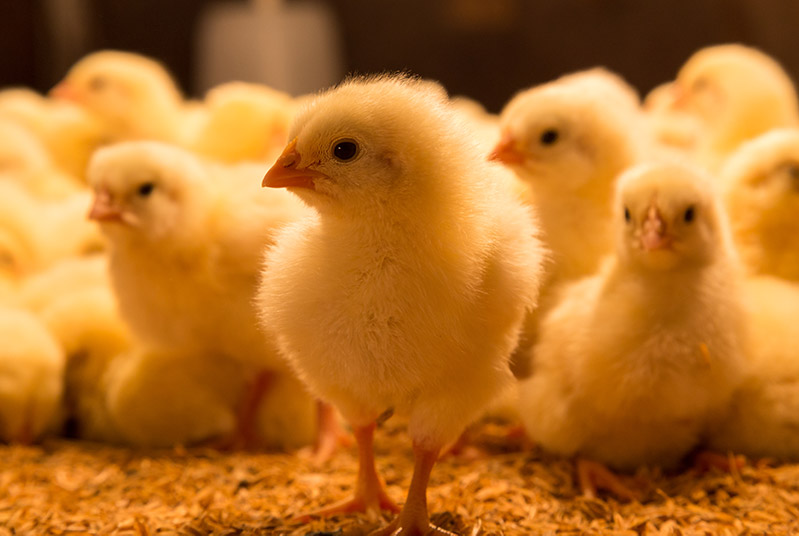Section 4 | Prevention Strategies for Coccidiosis
Industry
Page 25 /
Feed Additives & Gut Health
When a bird is infected with Eimeria, there are changes in the normal bacterial flora that are present in their intestines. These changes lead to a decrease in ‘good’ bacteria (like Bacillales and Lactobacillales) and increase in bad bacteria (like Enterobacteriaceae)1. This is where a more explicit focus on the use of feed additives and gut health can play an important role.
Ask the expert:
Canadian poultry industry experts have several practical recommendations for developing and maintaining gut health in broilers from day 1:
- Ensure chicks are placed on feed immediately. They should not have to spend time at placement searching for feed and water, and if placed on litter they will ingest litter. This time period is critical in setting up the chick’s gut flora. Use feed pans as well as place feed on paper for easier access
- Check water pressure so that chicks can drink easily
- Be sure to check on chicks shortly after placement (within 4 hours and again at 24 hours); these birds should still be on feed, if they are not, recheck every 20-60 minutes to ensure water and feed intake occurs. This will help to establish gut flora. When the gut is empty, the bacterial flora is affected. Good bacteria may be gone, and opportunistic bacteria may have an opportunity to grow in great quantities
- Monitor and record growth, particularly in the first week. Chicks should quadruple their weight by 7 days after placement
The Chicken Farmers of Canada have developed a video resource for monitoring chick weight:
Probiotics
Containing one or multiple species of bacteria, such as Lactobacillus, Enterococcus, and/or Bifidobacterium, have been proposed as a way to combat coccidiosis and improve gut health and balance. Some of these products have been shown to reduce oocyst shedding and lesion score values as well as improve weight gain2,3.
As mentioned previously, for feed additives to work effectively, they must be used in birds that have developed, and healthy guts. Starting chicks off right and utilizing a feed additive to optimize performance will be more effective than using a probiotic on an unhealthy or unbalanced gut.
Natural Products
The use of natural products as an alternative to anticoccidial drugs have been explored, including plant extracts and fungal extracts, however, these products have not been well researched.
More research is needed to evaluate these products as a viable approach, however, the evidence for using probiotics is continuing to develop
Balancing Gut Health
This article by The Poultry Site outlines the importance of maintaining a good balance between the:
- Normal bacteria flora of the gut (the bacteria that are normally there in low levels that aid in digestion)
- Mucosa of the intestine (the gut lining, and ensuring that it is not irritated so as to inhibit absorptive capacity)
- Birds’ nutrition (is the diet well balanced and of high quality?)
When one of the above aspects is out of balance, the gut begins to produce higher volumes of mucus as protection against irritation. This high production of mucus creates ideal breeding grounds for bacterial growth, which is where we see proliferation of high levels of harmful Clostridium bacteria associated with necrotic enteritis.
Check out the article here: Gut health: Coccidiosis, enteritis, and nutritional management for more information.
References:
- Macdonald, S.E., M.J. Nolan, K. Harman, K. Boulton, D.A. Hume, F.M. Tomley, R.A. Stabler, and D.P. Blake. 2017. Effects of Eimeria tenella infection on chicken caecal microbiome diversity, exploring variation associated with severity of pathology. PLoS One.
- Giannenas, I., E. Tsalie, E. Triantafillou, S. Hessenberger, K. Teichmann, M. Mohnl, and D. Tontis. 2014. Assessment of probiotics supplementation via feed or water on the growth performance, intestinal morphology and microflora of chickens after experimental infection with Eimeria acervulina, Eimeria maxima, and Eimeria tenella. Avian Pathol. 43:209-216,
- Ritzi, M.M., W. Abdelrahman, M. Mohnl, and R.A. Dalloul. 2014. Effects of probiotics and application methods on performance and response of broiler chickens to an Eimeria challenge. Poultry Science. 93:2772-2778.
